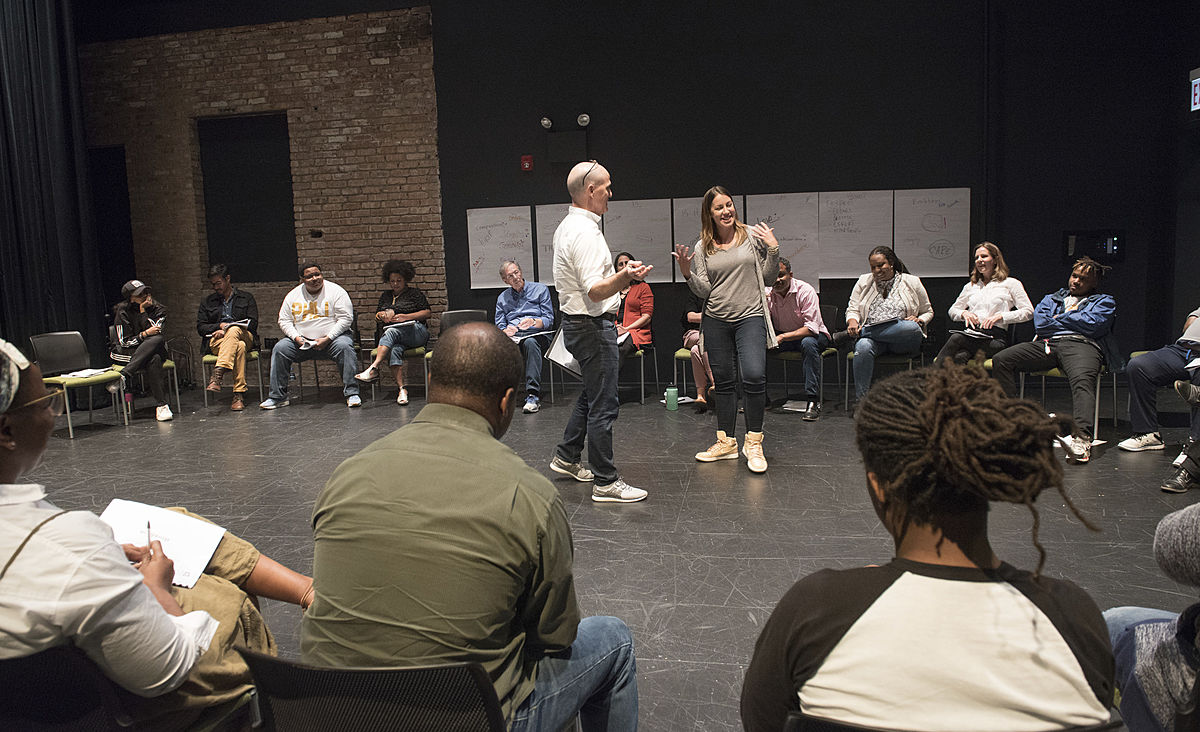Civic actors are people who work to make a difference in their communities’ quality of life. Last month, as part of a new partnership between Court Theatre and the Office of Civic Engagement (OCE), 22 of Chicago’s established and emerging civic actors explored what it was like to become literal actors, creating scenes onstage at the Green Line Performing Arts Center and engaging in dialogue about the roles they play as leaders.
The group, which included leaders from South Side nonprofits, foundations, media, and the University, made up the first cohort of the Civic Actor Studio (CAS) at the University of Chicago, an innovative leadership retreat that offers a new way to leverage the University’s resources to benefit people working in the civic sector.
Joanie Friedman, executive director of civic leadership at OCE, says that CAS centers on two goals: “The first goal is to help individuals build leadership capacity for their organizations, and the second goal is to serve as a ‘trust accelerator’ that builds strong connections among leaders to help strengthen the fabric of the South Side.”
Every leader contains multitudes
CAS has its roots in the UChicago Civic Leadership Academy, where one of the most popular exercises in the curriculum draws on the “Stage Page Tool” by executive coach Barbara Lanebrown and adapted for the retreat by Harry L. Davis, the Roger L. and Rachel M. Goetz Distinguished Service Professor of Creative Management at the Booth School of Business. To create the framework for CAS, Davis and Charles Newell, the Marilyn F. Vitale Artistic Director of Court Theatre, combined the tool with classic theater techniques that help actors access their voice and power.
Davis, a champion of the arts as a source of insight about leadership, asserts that leadership is a performance art. He says that many leaders feel inauthentic when they encounter situations that require them to display different versions of themselves — but in truth, all of us play a wide range of “characters” that vary according to the situations we’re in and the audiences we face. Our characters vary not because we’re inauthentic, but because we draw on different parts of ourselves at different times.
Davis is one of the CAS facilitators, along with Newell and Gabrielle Randle, dramaturg and Court research fellow. During the intensive four-day retreat, participants read and discussed scenes from the Greek tragedy Antigone, examining its themes of justice and fate and the leadership attributes of the characters. Theater exercises helped participants access the characters they contain within themselves that can be helpful to them in multiple work scenarios.

“One of the things we tried to focus on was tapping into the most authentic self,” said Newell. “Our goal was to create an opportunity for people to be more powerfully themselves as leaders, and that happened in literally 22 different ways. The word ‘substantial’ is insufficient to describe what went on. It was transformational.”
Participant Myetie Hamilton, incoming executive director of City Year Chicago and board chair of the Provident Foundation, calls the retreat “a really intimate experience” and said that it taught her new ways to lead. “The greatest takeaway was around being intentional in how you show up in different situations — what character do you need to show up as in order to be most effective?
“At some moments, you have to be a firm leader; some moments require you to be an inspirational leader; sometimes you’re a collaborative leader; sometimes you’re directional. This experience was about identifying within yourself all these areas of character that are already in you, which is a very different approach from more common types of leadership development work.”
The next phase of CAS takes place through 2021, with participants gathering to see and discuss Court productions of Oedipus Rex, The Gospel at Colonus, and Antigone. They’ll also take part in post-performance public talkbacks, beginning with the December 5, 2019, performance of Oedipus Rex (get tickets here if you’d like to attend). By the end of the two-year CAS experience, organizers hope, participants will have learned new frameworks for self-awareness of their leadership behavior, and strengthened their social capital via new relationships.
Both are already happening among the pilot cohort. “It was transforming in the sense of looking at yourself as a leader through a different lens,” Hamilton said, and the intimacy of CAS built strong connections: “I see opportunities for collaboration with some of the others in the space, and ways that we can maximize our impact by working together.”
“The idea of questioning everything and experimenting with what we consider to be ‘rules’ served as real food for thought” during CAS, said participant Dominique Atwood of Deeply Rooted Dance Theater. To continue the learning experience, all CAS participants (or designees from their organizations) are eligible for a full-tuition scholarship for one course in the University’s Master of Liberal Arts degree program, an interdisciplinary program designed for working professionals.
Civic Actor Studio participants work with Community Programs Accelerator member nonprofits 100 Black Men of Chicago, ABJ A.R.T.S, Affinity Community Services, Chasing23, Chicago Hyde Park Village, Deeply Rooted Dance Theater, LINK Unlimited Scholars, the Odyssey Project of Illinois Humanities, Pilot Light, and the Provident Foundation; the philanthropic organizations Chicago Community Trust, the Field Foundation, and Illinois Humanities; the University; and WBEZ’s Vocalo.
For more information about the Civic Actor Studio, email Joanie Friedman at joaniefriedman@uchicago.edu.



